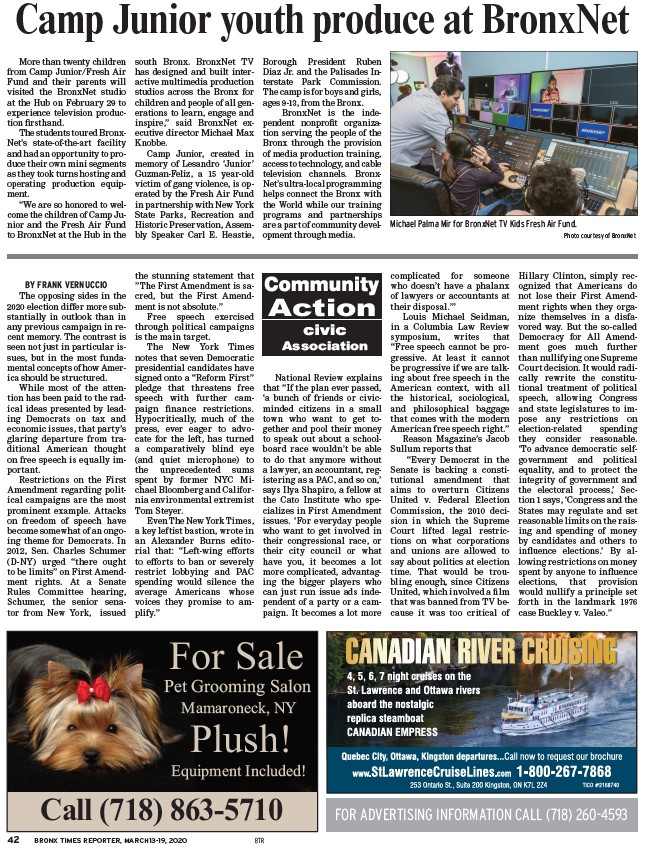
Camp Junior youth produce at BronxNet
For Sale
Pet Grooming Salon
Mamaroneck, NY
Plush!
Equipment Included!
Call (718) 863-5710
BRONX TIMES R 42 EPORTER, MARCH13-19, 2020 BTR
Action
Association
More than twenty children
from Camp Junior/Fresh Air
Fund and their parents will
visited the BronxNet studio
at the Hub on February 29 to
experience television production
fi rsthand.
The students toured Bronx-
Net’s state-of-the-art facility
and had an opportunity to produce
their own mini segments
as they took turns hosting and
operating production equipment.
“We are so honored to welcome
the children of Camp Junior
and the Fresh Air Fund
to BronxNet at the Hub in the
south Bronx. BronxNet TV
has designed and built interactive
multimedia production
studios across the Bronx for
children and people of all generations
to learn, engage and
inspire,” said BronxNet executive
director Michael Max
Knobbe.
Camp Junior, created in
memory of Lesandro ‘Junior’
Guzman-Feliz, a 15 year-old
victim of gang violence, is operated
by the Fresh Air Fund
in partnership with New York
State Parks, Recreation and
Historic Preservation, Assembly
Speaker Carl E. Heastie,
Borough President Ruben
Diaz Jr. and the Palisades Interstate
Park Commission.
The camp is for boys and girls,
ages 9-13, from the Bronx.
BronxNet is the independent
nonprofi t organization
serving the people of the
Bronx through the provision
of media production training,
access to technology, and cable
television channels. Bronx-
Net’s ultra-local programming
helps connect the Bronx with
the World while our training
programs and partnerships
are a part of community development
through media.
Michael Palma Mir for BronxNet TV Kids Fresh Air Fund.
Photo courtesy of BronxNet
BY FRANK VERNUCCIO
The opposing sides in the
2020 election differ more substantially
in outlook than in
any previous campaign in recent
memory. The contrast is
seen not just in particular issues,
but in the most fundamental
concepts of how America
should be structured.
While most of the attention
has been paid to the radical
ideas presented by leading
Democrats on tax and
economic issues, that party’s
glaring departure from traditional
American thought
on free speech is equally important.
Restrictions on the First
Amendment regarding political
campaigns are the most
prominent example. Attacks
on freedom of speech have
become somewhat of an ongoing
theme for Democrats. In
2012, Sen. Charles Schumer
(D-NY) urged “there ought
to be limits” on First Amendment
rights. At a Senate
Rules Committee hearing,
Schumer, the senior senator
from New York, issued
the stunning statement that
”The First Amendment is sacred,
but the First Amendment
is not absolute.”
Free speech exercised
through political campaigns
is the main target.
The New York Times
notes that seven Democratic
presidential candidates have
signed onto a “Reform First”
pledge that threatens free
speech with further campaign
fi nance restrictions.
Hypocritically, much of the
press, ever eager to advocate
for the left, has turned
a comparatively blind eye
(and quiet microphone) to
the unprecedented sums
spent by former NYC Michael
Bloomberg and California
environmental extremist
Tom Steyer.
Even The New York Times,
a key leftist bastion, wrote in
an Alexander Burns editorial
that: “Left-wing efforts
to efforts to ban or severely
restrict lobbying and PAC
spending would silence the
average Americans whose
voices they promise to amplify.”
National Review explains
that “If the plan ever passed,
‘a bunch of friends or civicminded
citizens in a small
town who want to get together
and pool their money
to speak out about a schoolboard
race wouldn’t be able
to do that anymore without
a lawyer, an accountant, registering
as a PAC, and so on,’
says Ilya Shapiro, a fellow at
the Cato Institute who specializes
in First Amendment
issues. ‘For everyday people
who want to get involved in
their congressional race, or
their city council or what
have you, it becomes a lot
more complicated, advantaging
the bigger players who
can just run issue ads independent
of a party or a campaign.
It becomes a lot more
complicated for someone
who doesn’t have a phalanx
of lawyers or accountants at
their disposal.’”
Louis Michael Seidman,
in a Columbia Law Review
symposium, writes that
“Free speech cannot be progressive.
At least it cannot
be progressive if we are talking
about free speech in the
American context, with all
the historical, sociological,
and philosophical baggage
that comes with the modern
American free speech right.”
Reason Magazine’s Jacob
Sullum reports that
“Every Democrat in the
Senate is backing a constitutional
amendment that
aims to overturn Citizens
United v. Federal Election
Commission, the 2010 decision
in which the Supreme
Court lifted legal restrictions
on what corporations
and unions are allowed to
say about politics at election
time. That would be troubling
enough, since Citizens
United, which involved a fi lm
that was banned from TV because
it was too critical of
Hillary Clinton, simply recognized
that Americans do
not lose their First Amendment
rights when they organize
themselves in a disfavored
way. But the so-called
Democracy for All Amendment
goes much further
than nullifying one Supreme
Court decision. It would radically
rewrite the constitutional
treatment of political
speech, allowing Congress
and state legislatures to impose
any restrictions on
election-related spending
they consider reasonable.
‘To advance democratic selfgovernment
and political
equality, and to protect the
integrity of government and
the electoral process,’ Section
1 says, ‘Congress and the
States may regulate and set
reasonable limits on the raising
and spending of money
by candidates and others to
infl uence elections.’ By allowing
restrictions on money
spent by anyone to infl uence
elections, that provision
would nullify a principle set
forth in the landmark 1976
case Buckley v. Valeo.”
FOR ADVERTISING INFORMATION CALL (718) 260-4593